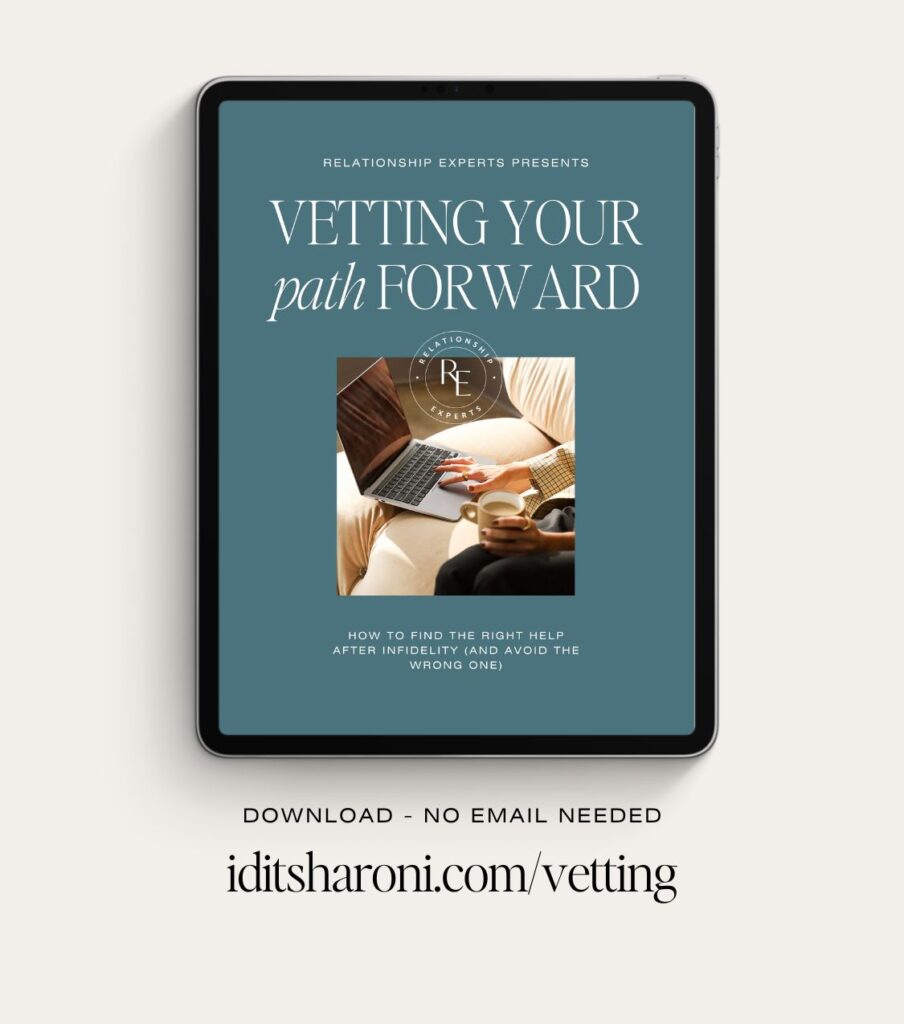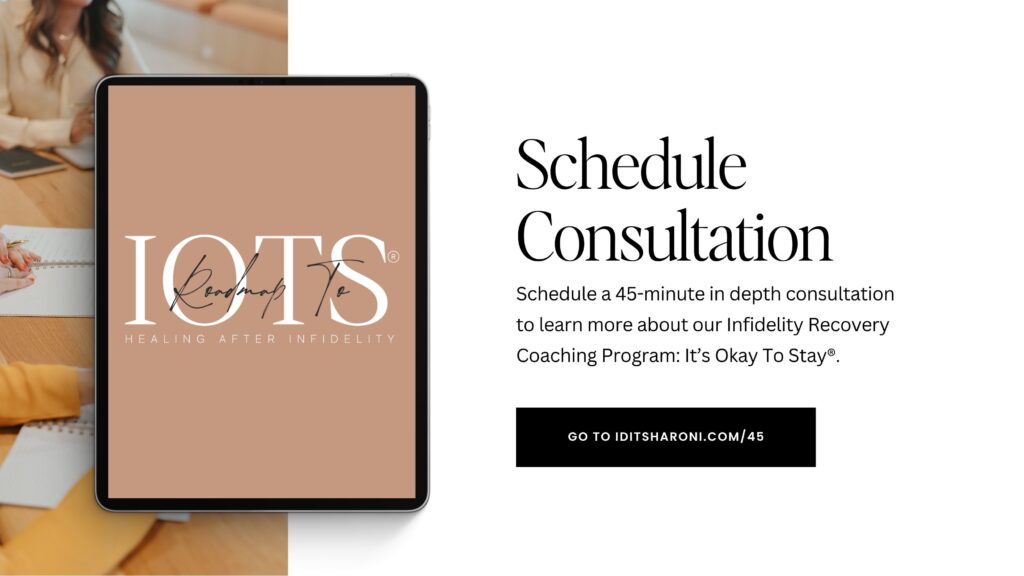When infidelity turns your world upside down, one of the first questions couples ask is: “Where do we turn for help?” The search for support often begins in desperation, long nights scrolling online, asking friends for referrals, or trying out an affair recovery therapist without really knowing if they’re equipped for something as painful as betrayal.

Unfortunately, many couples discover the hard way that not every professional is prepared to guide them through affair recovery. Some feel stuck in endless sessions with no direction. Others find themselves in programs that make big promises but don’t deliver. A few even feel scammed by unqualified “experts.”
If this is where you find yourself, you are not alone. And here’s the good news: it is possible to find the right affair recovery therapist or affair recovery program to walk with you through this season. In this blog, I’ll help you understand what effective help looks like, how to recognize it, what steps to take in your search, and what red flags to watch out for along the way.
WATCH THIS EPISODE ON YOUTUBE
Listen to This Blog On Spotify
Why Is It So Critical to Find the Right Affair Recovery Therapist to Help Early On?
In the aftermath of infidelity, couples are not only dealing with heartbreak. They’re navigating trauma. Trust is fractured, emotions run high, and both partners may feel like they’re on opposite sides of a deep divide.
Why desperation makes you vulnerable
It’s natural to want quick relief, but desperation can cloud judgment. I’ve seen couples who jumped into the first program they found, only to realize months later that it wasn’t helping. Some walked away more discouraged, believing healing wasn’t possible.
A client once told me that after trying several different therapists, she began to believe that “maybe no one can help us.” But the truth wasn’t that she was beyond hope, it was that she hadn’t yet found the right kind of support.
What’s at stake if you choose the wrong affair recovery specialist
When couples invest in the wrong kind of therapy, they lose more than money. They lose time and often hope. Prolonged exposure to ineffective or harmful guidance can deepen depression, intensify conflict, and in some cases, push couples closer to separation.
The right help, on the other hand, can be life-changing. With the right therapist or program, couples can rebuild trust, process pain in a healthy way, and even create a stronger relationship than before.
What Does Real, Effective Help After Infidelity Look Like?
Not all therapists or affair recovery programs are created equal. Here are the qualities that signal you’ve found support you can rely on.
A structured process, not endless talking
While talking is important, healing requires more than open-ended conversations. A structured process keeps you moving forward with clarity and direction. You should know what stage you’re in, where you’re headed, and how progress will be measured.
In our work, for example, we guide couples through three phases of recovery: stabilizing after the crisis, repairing the connection, and creating a renewed relationship. Each step has purpose and direction.
Evidence-based methods, not personal theories
Beware of methods that sound catchy but aren’t backed by research. Look for therapists who draw from established, evidence-based approaches such as Emotionally Focused Therapy, the Gottman Method, or trauma-informed frameworks. These approaches have decades of research showing they help couples recover from betrayal.
Focus on the relationship, not just individuals
Infidelity is a relational wound. Healing must happen within the relationship itself. While individual therapy may help with personal processing, recovery requires a therapist who works with both partners together, balancing their needs and guiding them toward rebuilding trust.
A professional with real credentials
Perhaps most importantly, the right help comes from someone trained and licensed in mental health. Licensure ensures accountability, ethical standards, and real clinical training. You should be able to verify their license and confirm that they specialize in working with couples facing betrayal.
How Do You Search for the Right Affair Recovery Therapist or Program?
The process can feel overwhelming, but breaking it down into steps makes it more manageable.

What should you type into Google or AI search?
Instead of broad searches like “marriage counselor near me,” use more specific terms such as “infidelity recovery therapist,” “affair recovery program,” or “betrayal trauma couples therapy.”
Pay attention to whether a provider shows up in organic results, not just ads. Consistently ranking in search usually means they’ve built trust and credibility over time.
What should you look for on a website?
A strong website is transparent. You should see full names, bios, licenses, and details about their specialties. There should be clear explanations of the services offered, and ideally, free resources like blogs, podcasts, or videos that showcase their expertise.
Websites that are vague, generic, or thin on content are a red flag. If you can’t get a sense of who they are or how they work, it may not be worth your time.
Should you ask for referrals?
Yes. If a friend, therapist, or trusted source recommends someone, that can be helpful. But ask follow-up questions. Did they have a structured process? If the therapist specialize in infidelity recovery? Did they use research-backed tools?
Why is a consultation valuable?
Speaking to a provider directly is one of the best ways to decide if they’re a fit. Whenever possible, talk to the therapist who will actually work with you, not just a salesperson. A good consultation should feel like a conversation about your needs, not a sales pitch.
What Red Flags Should You Be Aware Of When Looking For An Affair Recovery Therapist?
Just as important as knowing what to look for is knowing what to avoid.
Self-appointed experts
Be cautious of anyone calling themselves a “relationship coach” or “affair recovery expert” without clinical training or a license. Titles can sound impressive but mean very little without proper qualifications.
Generalists
A provider who works with “everything” — anxiety, depression, parenting, and couples — may not have the specialized experience needed for infidelity recovery. This is a complex issue that requires depth, not breadth.

Lack of transparency
If a website doesn’t list licenses, credentials, or details about the team, pause. If methods are described vaguely or with unrealistic promises, proceed carefully.
Content that feels thin or generic
If the site looks like it could apply to any problem and offers little original content, it may not reflect true expertise. Genuine experts share their knowledge openly through blogs, podcasts, or videos.
Consultations focused only on sales
If your first interaction is with someone who is clearly trained to sell rather than to assess your needs, this is a red flag. Therapists with integrity will let you know if they aren’t the best fit and refer you to someone else.
How Should You Prepare for a Consultation?
A consultation is your opportunity to gather information and decide if a provider is right for you. The more prepared you are, the more confident you’ll feel.

Do your research before the call. Read through the website, check the provider’s background, and engage with their free content so you understand their approach. Verify their license using your state’s lookup tool.
Bring your questions with you. Ask about their process, how they structure recovery, whether they use evidence based methods, and how progress will be measured.
During the call, pay attention to how you feel. Do you feel heard, understood, and supported? Or do you feel pressured? A good consultation will prioritize your well being, not just enrollment.
Finally, be honest with yourself. If the fit feels right, be ready to take the next step. If not, keep looking. Your healing after infidelity is too important to settle for less.
WATCH THIS EPISODE ON YOUTUBE
Listen to This Blog On Spotify
What Steps Can You Take Right Now?
If you’re searching for the right therapist or program after infidelity, here are a few ways to take action today:
- Begin your search with specific keywords like “infidelity recovery therapist” or “affair recovery program”.
- Review websites carefully for transparency, credentials, and content.
- Download our free guide, Vetting Your Path Forward, to keep red flags and key questions close at hand.
- Schedule a consultation with a licensed therapist or program that specializes in affair recovery.
Final Thoughts: You Deserve the Right Kind of Help, the Right Affair Recovery Program
The pain of infidelity can make you feel isolated, broken, and hopeless. But you are not beyond repair, and your relationship is not automatically over. Healing is possible, but only with the right kind of support.
Choosing the wrong help can set you back. Choosing the right help can restore trust, bring clarity, and give you a renewed sense of hope for your future.
To learn more about our structured, research-based infidelity recovery program, visit relationshipexpertsonline.com.
And if you’re ready to explore whether our program is right for you, schedule your free 45-minute consultation with our program specialist today.
Take your next step here:

Comments +